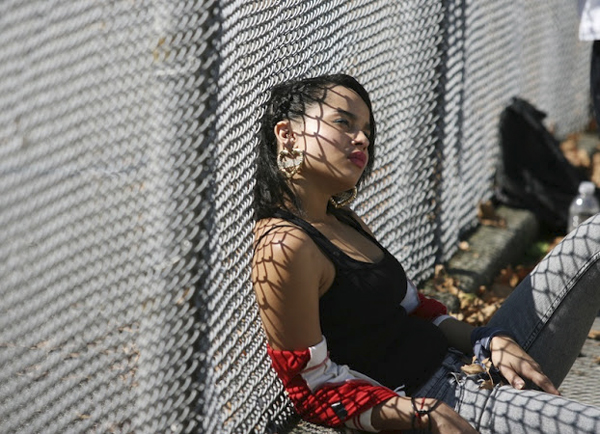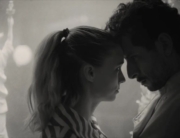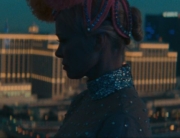
Zoë Kravitz as Sweetness (MPI Pictures)
Zoë Kravitz gives a powerful performance as Sweetness O’Hara in this coming-of-age indie. Actress-turned-first-time-director Victoria Mahoney tells her story in vignettes chronicling Sweetness’ troubled home life and, consequently, tumultuous time in school. It’s an impressive depiction of common adolescent rebellion and exploration, while also balancing an intense examination of Sweetness’ struggles within the harsh world in which she is growing up.
In the beginning, Sweetness is a shy, quiet girl from a poor Queens neighborhood who keeps to herself. The opening scene shows Sweetness being bullied by some neighborhood kids who want her bike, a symbol of childhood that runs throughout the film. She is unwilling to stand up for herself, but this slowly changes as she shifts from helpless kid to defiant teenage girl. Also influencing Sweetness’ transformation is her unstable home life in her racially diverse family. (Her father is Irish American; her mother, African American).
Her father comes in and out of her life, as he is dealing with substance abuse problems and has trouble supporting his family. Due to her father’s violent and unpredictable ways, her mother is unable to mentally handle the situation at home, and she’s often absent, too. Sweetness and her older sister Ola appear close, but Ola’s temper puts a strain on their relationship. She also leaves Sweetness for a time—she’s pregnant and seemingly uncomfortable with bringing a baby into her parent’s home.
At school, Sweetness initially turns to selling drugs and stealing to help out at home. She soon gets in over her head when she falls in with a group of girlfriends that send her further down a path of violence and substance abuse. This includes beating up fellow students and using the same drugs she tries to sell.
Yelling to the Sky boosts an impressive supporting cast. Gabourey Sidibe (Precious) plays a local bully who becomes an adversary of Sweetness at school. Actor and film director Tim Blake Nelson shows up as a school official trying to help Sweetness, though he has problems keeping appropriate boundaries with his students. Perhaps most impressive is Jason Clarke, who plays her distressed father. Clarke, who was last seen this past summer in Lawless and will be starring in the much anticipated Zero Dark Thirty, gives an effective performance of a man who can’t seem to ever do right by his family. While her story is clearly the focus, it’s his and Sweetness’ complex relationship that becomes the heart of the film.
While Sweetness’ transformation is understandable considering her dire circumstances, the pacing of the film feels a bit awkward at times. The jump from her as a shy, scared kid to a rebellious teen seems somewhat arbitrary and quick. Nevertheless, Kravitz manages to convey Sweetness’ under-the-surface emotions without much need for dialogue, especially towards the beginning of the film. The characters’ motivations don’t necessarily need a clear explanation, though some clarity on timing of events would have been helpful. I never felt like I got my footing in Sweetness’ world, partially because of the quick cuts, shaky camera movements, and the unsettling soundtrack, which mixes hip hop and rap with a more traditional film score. Perhaps that was Mahoney’s intention, to let the audience get to know Sweetness, but keeping them as uprooted in her world as she is.






Leave A Comment